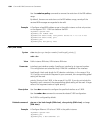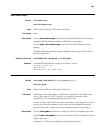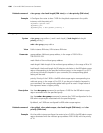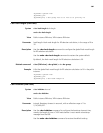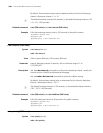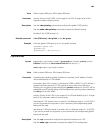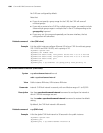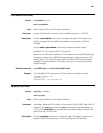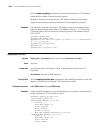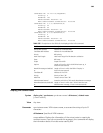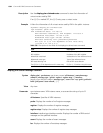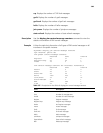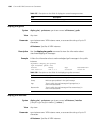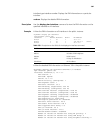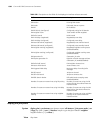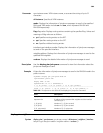
1392 CHAPTER 90: PIM CONFIGURATION COMMANDS
Use the undo crp-policy command to remove the restrictions in C-RP address
ranges and the ranges of served multicast groups.
By default, there are no restrictions on C-RP address ranges and the address
ranges of served groups, namely all received C-RP messages are accepted.
Example # In the public instance, configure a C-RP address range and a range of served
multicast groups so that only routers in the address range of 1.1.1.1/32 can be
C-RPs and these C-RPs can serve only multicast groups in the address range of
225.1.0.0/16.
<Sysname> system-view
[Sysname] acl number 3000
[Sysname-acl-adv-3000] rule permit ip source 1.1.1.1 0 destination 2
25.1.0.0 0.0.255.255
[Sysname-acl-adv-3000] quit
[Sysname] pim
[Sysname-pim] crp-policy 3000
display pim bsr-info
Syntax display pim [ vpn-instance vpn-instance-name | all-instance ] bsr-info
View Any view
Parameter vpn-instance-name: VPN instance name, a case sensitive string of up to 31
characters.
all-instance: Specifies all VPN instances.
Description Use the
display pim bsr-info command to view the BSR information in the PIM
domain and the locally configured C-RP information in effect.
Related command: c-bsr (PIM view) and c-rp (PIM view).
Example # View the BSR information in the PIM-SM domain in the public instance and the
locally configured C-RP information in effect.
<Sysname> display pim bsr-info
Vpn-instance: public net
Elected BSR Address: 12.12.12.9
Priority: 0
Hash mask length: 30
State: Elected
Scope: Global
Uptime: 00:00:56
Next BSR message scheduled at: 00:01:14
Candidate BSR Address: 12.12.12.9
Priority: 0
Hash mask length: 30
State: Elected
Scope: Global



